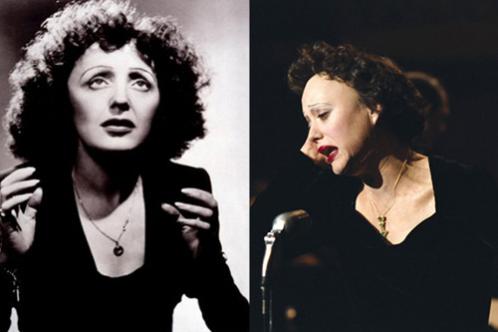...Mes chagrins, mes plaisirs, je n'ai plus besoins d'eux...
 |
| On the one side, La Môme herself, on the other, Marion Cotillard in the 2007 film. |
I just finished watching "La Vie En Rose," or "La Môme," as it is called in its French distribution. It was not the easiest film to watch, mostly because the bare framework of events of the artist's life were so bitterly painful. Not only did the misfortunes of Edith Piaf's life use her up, but she used herself harshly as well--living experience to the hilt, yes, but also destroying her body in the process, so that by the time she died at 48 she was so wasted and frail she could have been 85. Aside from the dolorous subject, the film itself was difficult to follow (and not just because I am still struggling to understand all the French vocabulary). The narration jumped backwards and forwards in time so much that it was almost impossible to get a sense of the causes and effects of events. People came into and fell out of Piaf's life, and it was very hard to understand the whys and the wherefores of it all, let alone her responses to specific events outside of a general passionate imperiousness and brutal suffering. Perhaps the crazy-quilt sensibility was the intention, though--it certainly suggested the chaotic and unstable nature of Piaf's existence, and the way that good fortune and calamity both seemed to fall out of the sky onto her head.
I have a lot of impatience with the profusion of celebrity biopics in recent years, and with the assumption that an actor is accomplishing a great feat when they take on what could be argued is merely an impersonation or caricature. Isn't it a greater feat as an actor to make the audience believe in the vitality and the verisimilitude of an imaginary person? I could go on a length, but the NY Times review of the movie expresses my criticisms on that front a lot better here.
Although I agree with that critic's point about biopics, I am not sure about his assertion that American's cannot appreciate how great a star Piaf was. This American certainly does, and--although I definitely had my reservations about the film--I thought that the amount of her actual music that it included made in an experience well worth its limitations. Marion Cotiallard is a fiery actress, and she channeled a lot of brimstone for the role, but I though the real star of the film was the actual recording of Piaf's voice. Her songs lifted up the film, and brought it together. Milord, L'hymne à l'amour, L'accordioniste .... As I watched, I waited for the great songs to come on, one by one, and finally, at the end, when I knew it was coming, she sang the greatest: Non, je ne regrette rien.
I saw part of this movie with my parents. They didn't like it at all -- partly because they didn't care much for Edith Piaf and partly I think they found the narration style confusing. I would have kept watching if it were just me, though.
ReplyDeleteI try to like Edith Piaf but her voice bothers me. My friend Lara loves her and also Judy Garland -- she loves big-voiced singers with sad life stories, but for me, life stories aside, I have a hard time listening to a female voice which is not pretty, not smooth, (lol unless the song is supposed to be funny, like the Santa Claus's wife one from Songs for a New World...) blame my growing up with so much musical theatre, I guess...
Then again, I don't think its an American vs French thing. I'm also not a big fan of Judy Garland or Maria Callas (another of my friend Lara's favorites) and I think she finds my favorite female artists (Esther Ofarim, Nana Mouskouri, Fortuna) too thin and perhaps too technical.